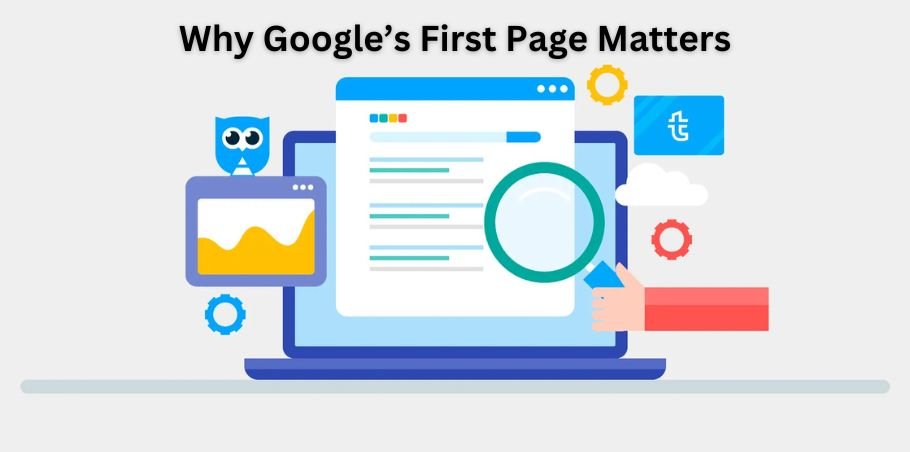In today’s digital world, ranking how to get on first page of google search david aziz is the ultimate goal for businesses, bloggers, and website owners. But the road to that coveted position can feel like an uphill battle. So, how do you get there? David Aziz, a recognized SEO expert, offers a unique perspective and actionable strategies that can help anyone achieve this feat.
Understanding Google’s Search Algorithm
How to get on first page of google search david aziz algorithms are constantly evolving, but they are primarily designed to serve the most relevant content to users. Here’s a look at how these algorithms work and what you need to know:
How Google Ranks Pages
Google uses over 200 ranking factors, including relevance, quality, user experience, and more. Some key elements include:
- Keywords: The words and phrases users search for.
- Backlinks: Links from other websites pointing to yours.
- Page Speed: How fast your page loads.
- Mobile-Friendliness: How well your site performs on mobile devices.
The Role of Content in SEO
High-quality, relevant content is the cornerstone of SEO. Google prioritizes websites that provide valuable information that answers users’ questions.
Why Google’s First Page Matters

Getting your website to the first page of Google is the holy grail for many businesses and content creators. But why does it matter so much? Here’s a closer look at why appearing on Google’s first page is crucial for online success:
Visibility and Traffic
The most obvious reason how to get on first page of google search david aziz matters is visibility. Studies show that the majority of people never go beyond the first page of search results. In fact, around 75% of users don’t even scroll past the first five results. This means if your website isn’t on that first page, you’re missing out on a huge chunk of potential traffic.
Being on the first page increases your chances of being seen by users who are actively searching for products, services, or information related to your business. This visibility can translate directly into increased website visits, which can lead to more sales, leads, or conversions.
Trust and Credibility
Google’s first page is often seen as a sign of credibility and trust. Users tend to trust websites that appear at the top of search results because they assume these websites are the most relevant and authoritative. Being on the first page signals to users that your website is a trusted source of information in your industry or niche.
It’s not just about being seen, but about being perceived as an expert or leader. For many, a high Google ranking is a social proof of quality and reliability.
Competitive Advantage
If your competitors are ranking on the first page, and you aren’t, you’re likely losing out on potential customers. Appearing on the first page of Google gives you a significant competitive edge over those who are buried on page two or beyond.
When your business ranks higher, you increase your chances of attracting customers before your competitors even have a chance. Not only does it help you capture more traffic, but it can also enhance your brand’s reputation.
Cost-Effective Marketing
SEO (Search Engine Optimization), which is the strategy behind ranking on Google’s first page, is one of the most cost-effective forms of marketing. Unlike paid ads, which require continuous investment, organic rankings through SEO can provide long-term benefits without recurring costs.
Once you’ve earned a spot on the first page, the traffic you receive can be sustained over time with fewer ongoing costs. Compare this to paid search ads, which stop delivering traffic as soon as you stop paying.
David Aziz’s Approach to Getting on the First Page
David Aziz’s SEO strategies focus on combining technical SEO with a deep understanding of user intent. Below are key insights and tactics that can help you rank higher.
Keyword Research the Foundation of SEO Success
Start with understanding what your target audience is searching for. Keyword research is crucial for identifying high-traffic terms and phrases relevant to your niche.
How to Conduct Effective Keyword Research
- Use tools like Google Keyword Planner, SEMrush, or Ahrefs.
- Focus on long-tail keywords that have lower competition but are highly specific.
- Analyze competitors to see what keywords they rank for.
On-Page SEO: Optimize for Relevance
On-page SEO refers to the elements on your website that you can control directly. These include your page titles, meta descriptions, headers, and internal linking structure.
Essential On-Page SEO Elements
- Title Tags: Include the main keyword.
- Meta Descriptions: Craft compelling summaries to improve click-through rates.
- Headers (H1, H2, H3): Use them to organize content and include relevant keywords.
Advanced Strategies to Secure a First-Page Ranking

Achieving a first-page ranking on Google is no easy feat. With billions of pages vying for attention, ranking in the top positions requires a combination of on-page SEO, technical optimizations, and strategic link-building. But beyond the basics, there are advanced strategies that can give you the edge over competitors and boost your chances of securing a coveted spot on the first page. Here’s how you can do it:
Conduct Thorough Keyword Research: Effective keyword research is the foundation of any SEO strategy. While targeting high-traffic keywords is important, advanced SEO requires going deeper into keyword analysis. You need to understand user intent and the competitive landscape for each keyword.
Use Long-Tail Keywords: Long-tail keywords are longer, more specific phrases that are less competitive but highly targeted. These keywords often have higher conversion rates because they capture searchers who know exactly what they’re looking for. For example, instead of targeting “SEO tips,” aim for something like “advanced SEO strategies for small businesses.”
Utilize Keyword Clusters: Instead of focusing on single keywords, build content around clusters of related keywords. Google values content that comprehensively answers user queries, so grouping similar keywords together helps Google understand your page as an authoritative source on the subject.
Google’s algorithms increasingly prioritize content that demonstrates high levels of expertise, authority, and trustworthiness. Here’s how to make sure your site checks these boxes:
Content is King How to Create High Quality Content
Google rewards content that is engaging, informative, and solves a problem. David Aziz stresses that your content should always focus on user intent and be written for humans, not just search engines.
- Create content that answers the user’s question in depth.
- Use engaging, conversational language.
- Break up text with images, bullet points, and subheadings for readability.
- Regularly update your content to keep it fresh.
Technical SEO: Ensuring Your Site is Google-Friendly
Technical SEO involves optimizing your website’s backend to ensure it is easy for search engines to crawl and index. This includes making sure your site is fast, secure, and mobile-friendly.
- Mobile Optimization: Google prioritizes mobile-friendly websites.
- Page Speed: Tools like Google PageSpeed Insights can help identify issues.
- SSL Certificate: Secure websites (HTTPS) are favored by Google.
Link Building: Gain Authority and Trust
Backlinks, or links from other websites to yours, are one of the most significant ranking factors. Building high-quality backlinks from reputable websites can boost your authority and help you climb the rankings.
- Reach out to industry influencers for guest blogging opportunities.
- Create shareable content like infographics, research studies, or expert roundups.
- Utilize broken link-building strategies to find and fix dead links on other websites.
User Experience (UX): Make Your Site Easy to Navigate

Google values websites that provide a seamless user experience. Factors like easy navigation, clear calls to action, and a clean, professional design can help improve your rankings.
- Simplify your website’s navigation.
- Make sure your site is visually appealing and easy to use.
- Include clear calls to action that guide visitors through your site.
Local SEO: Targeting Local Audiences
For businesses with a physical location or services limited to certain areas, local SEO is vital. David Aziz suggests optimizing your Google My Business listing and gaining local backlinks.
Steps for Local SEO Success
- Create and optimize your Google My Business profile.
- Use local keywords and phrases.
- Encourage reviews from local customers.
Measuring Your SEO Success key Metrics to Track
Once you’ve implemented these strategies, it’s essential to track your progress. Google Analytics and Google Search Console are two powerful tools to help measure the effectiveness of your SEO efforts.
Key Metrics to Monitor
- Organic Traffic: How many visitors are arriving at your site through search engines.
- Keyword Rankings: Track how well your targeted keywords are performing.
- Bounce Rate: The percentage of visitors who leave your site after viewing one page.
How to Analyze and Adjust Your SEO Strategy
SEO is a continuous process, and what works today might not work tomorrow. Regularly analyze your site’s performance and adjust your strategy as needed.
Common SEO Mistakes to Avoid

Many website owners make simple SEO mistakes that hurt their rankings. David Aziz advises being mindful of the following errors:
Keyword Stuffing: Overusing keywords in an unnatural way can lead to penalties from Google.
Ignoring Mobile Optimization: Failing to make your site mobile-friendly can severely impact your rankings.
Neglecting User Intent: Focusing solely on keywords without considering user intent can result in poor engagement and high bounce rates.
The Future of SEO: What’s Next?
SEO is always evolving, and staying ahead of the curve is essential for long-term success. David Aziz predicts that AI and machine learning will play an even bigger role in search algorithms, and businesses will need to adapt to new technologies and trends.
Read Also: Immediate X5 Intal: A Complete Overview
FAQs
How long does it take to rank on the first page of Google?
It typically takes several months to see significant results, depending on the competitiveness of your industry and the effectiveness of your SEO strategies.
Is it necessary to hire an SEO expert?
While anyone can learn and apply SEO, hiring an expert can help you achieve faster results and avoid common mistakes.
What is the most important factor for ranking on Google?
Content quality, backlinks, and technical SEO are all crucial factors for ranking on Google.
Can social media impact my SEO ranking?
While social media signals don’t directly impact SEO, sharing your content on social media can drive traffic and lead to more backlinks.
How can I improve my website’s loading speed?
Optimize images, use browser caching, and minimize code to improve page speed.
Conclusion
Ranking on how to get on first page of google search david aziz is a challenging yet achievable goal. By implementing the strategies outlined by David Aziz, focusing on high-quality content, technical SEO, and building authority through backlinks, you can increase your chances of reaching the top. Stay consistent, track your progress, and continuously adapt to Google’s algorithms.










